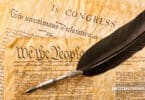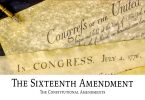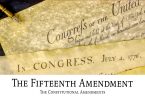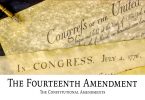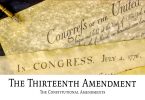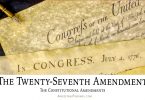The Nineteenth Amendment to the US Constitution guarantees women the right to vote. Up until that time, the right to vote for women was granted on a state level in some states, but they were still denied the right to vote in federal elections. The first proposed amendment for federal women’s suffrage was introduced into Congress in 1878, but it did not pass at that time. It would take until May of 1919 for that to happen.
Once the amendment passed both houses of Congress, it was sent to the states for ratification. The requisite number of states approved it, with Tennessee being the last of the thirty-six states required to approve it for it to be adopted. The Nineteenth Amendment was ratified and adopted to the US Constitution on August 26, 1920.
What Does it Say?
“The right of citizens of the United States to vote shall not be denied or abridged by the United States or by any State on account of sex.
Congress shall have power to enforce this article by appropriate legislation.”
What Does it Mean?
The idea of women voting was not new. Several of the colonies that would become the United States gave women the right to vote before 1776. Yet, by 1807, all of the states had their own constitutions that prohibited women from voting. By the mid-1800s, women’s suffrage gained more traction as a movement. Conventions were held to promote it, and legal arguments based on existing amendments were made to support it. The US Supreme Court struck down all of those arguments. So, women’s suffrage activists then focused on getting a Constitutional amendment ratified that would guarantee women the right to vote anywhere in the country.
After the Civil War, some western states did give women the right to vote at the state level. This gave women across the nation hope for nationwide women’s suffrage.
The entry of the United States into WWI was a tremendous turning point in public opinion of giving women the right to vote. Not only did women’s suffrage groups support the war movement, they made the argument that women should be rewarded for their patriotic services during the war by being given the right to vote. These groups also pointed out the hypocrisy of fighting abroad for democracy while denying women the right to vote at home. Eventually, after a number of marches, demonstrations, and even hunger strikes on the part of the women involved in the movement, US President Woodrow Wilson announced his public support of giving women the right to vote.
This support gave the amendment the votes it needed to pass in Congress. After it was adopted in 1920, it even withstood two legal challenges to it—Leser vs. Garnett and Fairchild vs. Hughes. Twenty-six million American women were enfranchised with the adoption of the Nineteenth Amendment. It was an important step forward in the quest for equal rights for women in the United States of America.

